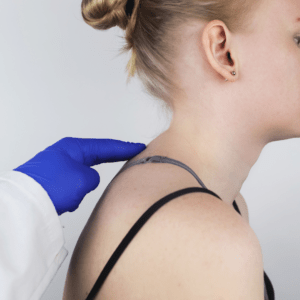Dealing With A Vitamin D Deficiency
If you think you might have a vitamin D deficiency, you’re not alone. About one in every five people in the UK have low vitamin D levels 😲. If you regularly feel fatigued 🥱, are experiencing bone 🦴 and back pain, or even struggling with depression 😔, a vitamin D deficiency is a possibility.
One of the most important roles that vitamin D plays in our bodies is to regulate our levels of calcium and phosphate. These nutrients are needed to keep your bones 🦴, teeth 🦷, and muscles 💪 healthy and functioning properly.
A lack of vitamin D, amongst other things, can lead to bone deformities called rickets, especially found in 🧒children. Bone pain is also caused by a lack of vitamin D in adults, this condition is called osteomalacia.
What Causes A Vitamin D Deficiency?
There are a few factors that can cause a vitamin D deficiency. These include:
- Not consuming enough foods containing vitamin D, such as fish 🐟 and dairy 🥛.
- Having limited exposure to sunlight 🌞 or living in an area where there’s little sun 🌦 year-round.
- Having a darker complexion.
- Your kidneys not being able to convert vitamin D to its active form.
- Your digestive tract not adequately absorbing vitamin D.
- Having chronic kidney disease, liver disease, or hyperparathyroidism.
- Having Crohn’s disease or celiac disease.
- Having gastric bypass surgery.
- Certain medications.
Symptoms Of A Vitamin D Deficiency
Some signs and symptoms of a vitamin D deficiency to look out for are:
- Bone, muscle, or back pain.
- Getting sick often.
- Unexplained fatigue.
- Depression or other changes in your mood.
- Slow healing wounds.
- Hair loss.
Having low levels of vitamin D in your body might also put you at higher risk for:
- Osteoporosis: This condition happens when new bone doesn’t generate at the same pace as the loss of old bone. Because one of vitamin D’s main roles is to maintain skeletal health, low levels of vitamin D can lead to low bone calcium stores.
- Depression: Lower levels of vitamin D may cause depression, anxiety, or other mood changes.
- Dementia: A vitamin D deficiency puts you at higher risk for dementia or Alzheimer’s disease.
- Diabetes: Research has found that there’s a link between vitamin D deficiency and diabetes as vitamin D plays a role in insulin sensitivity and resistance.
Ways To Get More Vitamin D In Your Diet
Some great sources of vitamin D include:
- Salmon, sardines, herring, mackerel, and other oily 🐠
- Red 🥩
- Egg 🍳
- Fat spreads, breakfast cereals, and other fortified foods like cow’s milk 🥛 and soy milk.
- Cod liver oil.
- Canned 🥫
- Mushrooms 🍄.
- Orange 🍊
- Get regular ☀
Supplements For Vitamin D
If you’re not getting enough vitamin D through sunlight and the foods you eat, you may need to take a vitamin D supplement 💊 to make sure you get enough of this important nutrient.
Vitamin D supplements are available in two forms: D2 (ergocalciferol) and D3 (cholecalciferol). Both are effective, but at a higher dose, studies have found D3 to be more effective. Vitamin D supplements are available as tablets, liquids, and sprays. The type of supplement you need will depend on your preferences and specific medical condition.
It’s important that you know that supplements of any kind are no substitute 🙅♀️ for a healthy diet 🍌 and lifestyle 🚶♂️. You should only take a vitamin D supplement if your body is not able to absorb enough of it from food 🦐 or sunlight 🌄.
If you suspect that you may have a vitamin D deficiency, it’s important to consult a healthcare practitioner👩⚕️. They can then run blood tests 💉 to determine if you have enough vitamin D in your body. If your levels are low, they’ll be able to tell you what you need, whether it’s through the food 🥗 you eat, getting more sunlight 🌞, or taking a supplement 💊.
Would you like to know more about nutrient deficiencies and how they affect your body? Keep an eye 👁 on our blog 📰 for more detailed information.





